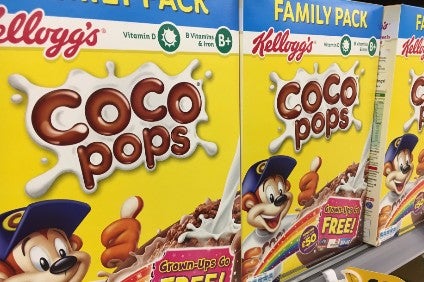
Kellogg today (3 August) reported lower half-year sales, hit in part by “soft consumption” in the US, but the Coco Pops cereal maker had more positive news on profits.
The Pringles owner posted a 3.3% fall in reported net sales to US$6.4bn for the first half of the company’s financial year, a period that ran until 1 July.

Discover B2B Marketing That Performs
Combine business intelligence and editorial excellence to reach engaged professionals across 36 leading media platforms.
Kellogg’s operating profit was down 8.3% at $813m due to costs linked to the US giant’s Project K restructuring programme.
However, the Special K maker said its currency-neutral, comparable operating profit, which excluded items including those costs, was up 4.6% at $1.07bn.
Kellogg’s first-half net profit rose 19.6% to $544m, helped in part by a tax benefit.
The company maintained its forecasts for annual currency-neutral comparable net sales – a metric that excludes the impact of factors like exchange rates and M&A – for its operating profit and for earnings per share.

US Tariffs are shifting - will you react or anticipate?
Don’t let policy changes catch you off guard. Stay proactive with real-time data and expert analysis.
By GlobalDataKellogg’s currency-neutral, comparable net sales dropped 3.8% during the first half of the year, after a 3.1% decline in the second quarter, a sequential improvement from the 4.4% year-on-year decrease in the first three months of 2017 but still an indication of the challenge facing the business.
By comparison, the company’s currency-neutral comparable net sales in the first half of 2016 did rise 7.6% but were boosted by inflation in Venezuela. Kellogg said at the time sales on that metric were down “modestly” when stripping out Venezuelan inflation from the numbers.
Today, Kellogg, reflecting on that sales metric during the second quarter of 2017, said “soft consumption trends in the US and reduced merchandising activity in Europe, related to pricing actions” weighed on its sales.
The sales performance of the seven divisions on which Kellogg reports was mixed, with three seeing increases but four year-on-year declines.
Kellogg’s three largest divisions – US snacks, US morning foods and Europe – all again saw first-half sales fall. The company said “category softness” hit its US snacks sales and pointed to the “soft consumption” in the country for the lower sales from morning foods, which includes cereal, although it said that division had seen a “sequential” improvement in sales.
In Europe, Kellogg said its Pringles brand had “lost” merchandising activity during talks with customers, negotiations it said had since been resolved.
Sales in Latin America were boosted by Kellogg’s acquisition in December of a controlling stake in Brazilian business Parati. Stripping out the impact of that deal, Kellogg, speaking of the second quarter, said its Latin American currency-neutral comparable net sales were down.
In Asia Pacific, Kellogg reported a return to growth in Australia and “continued broad-based growth in Asia” in the second quarter.





